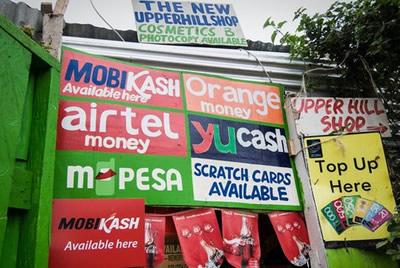Bringing banking to more Africans means aligning public and private sector objectives and exploiting the gains made by mobile money payment solutions.
Sending and receiving money by mobile phone – pioneered since 2007 by Kenya’s Safaricom with its M-Pesa platform – can include more people into the economy in Africa and be the base of more sophisticated forms of e-commerce, speakers said on 13 December at UNCTAD’s Africa eCommerce Week in Nairobi, Kenya.
More than 10% of adults in sub-Saharan Africa have a mobile money account -- the highest in the world -- and it is spreading to West Africa and beyond.
The United Nations says that giving “unbanked” Africans access to banking services – especially women and people living in remote rural areas -- boosts economic growth.
And while mobile money initially enabled people to make financial transactions on their phones, eliminating travel costs, it now extends to mobile credit, insurance, cross-border remittances, bill payments, airtime top-ups, and savings.

Njuguna Ndung’u, head of the Africa Economic Research Consortium and former governor of the Central Bank of Kenya, said that financial inclusion was a public policy objective but it relied on the private sector to take it forward. Governments must adapt to what the private sector provides in the payment solutions market, and consolidation of the two sides was vital, he said.
“The moment you have an easy, effective and safe payment solution, financial inclusion follows,” he said. Once the central banks realized that commercial banks were providing a platform to manage mini-accounts, they understood that the public policy goal of financial inclusion was being reached, Mr. Ndung’u said.
“We gave the private sector a chance to roll out innovative products and found that government could use the massive capacity of telecoms companies,” he said.
Mr. Ndung’u added that there was a risk of new forms of capital movements across platforms bypassing formal banking.
“My 18-year old son makes money gaming,” he said. “As a banking sector, we see that these financial flows have a real effect.”
Two sides of the coin
Reminiscing about his time in the Kenyan government when M-Pesa was licensed, UNCTAD Secretary-General Mukhisa Kituyi said: “We did not know how inefficient our payment systems were until we saw M-Pesa.”
But the lesson was that it was important for governments to be prepared to take a risk on new technological solutions and products, he said.
“There is a need for the state to drive infrastructure away from large concentrations of businesses and people,” he said. He also underlined that mobile money was good but having African-made products to buy was better: support for “productive capacity” in the economy was the other side of the coin.
But varied levels of progress remained in Africa, he said. For example, the ambition that 50% of Africans would use mobile money in 2022 had already been achieved in Kenya, where 73% of people already use it.
“The laggard states in Africa need peer pressure and exposure to best practice,” Dr. Kituyi said. National markets needed to go international, he said, so that people, money and goods could move easily.
“We also have a collective responsibility to grow the capacity of African governments to protect online consumers to build trust,” he added.
Elizabeth Rossiello, founder and chief executive officer of BitPesa, a digital foreign exchange and payment platform that leverages blockchain settlement for fast, cost-effective payments to and from Africa, said that her company was growing by leaps and bounds but still faced regulatory and infrastructure barriers across the continent.
“I think the problem is that innovation is happening so quickly that it comes at governments like a firehose,” she said. In some countries she had been able to work with governments on licencing to enter the market, in others she could not enter until the government developed the licence.
Ms. Rossiello also said third party entities would always fill the gaps between different financial services operators like payment solution providers, banks and post offices. The future of financial inclusion in Africa relied on connecting and updating the moving parts and newly introduced functions of the system.
Tech-savvy
Charles Mudiwa, chief executive of Stanbic Bank in Kenya, said banks saw fintech companies not as enemies but partners.
Mr. Mudiwa noted that mobile-based economic activity skewed to the 60% of Kenyans under the age of 18 who could not obtain an “economic identity” by law. This was a conundrum for all governments in Africa, where tech-savvy young people and children outnumbered older groups.
“It’s time to go beyond mobile money and look to e-commerce. It’s all about economic growth,” he said.
Isaac Guchugu, head of M-Pesa Product Development at Safaricom, the Kenyan telecommunications company that pioneered M-Pesa, said that M-Pesa and PayPal now worked together. However, it had been a long process, and one that was not yet being replicated across Africa.
“It’s time to go beyond payment solutions and bring more functionality to rural Africa,” Mr. Guchugu said.
In looking forward, Universal Postal Union Director-General Bishar A. Hussein looked back -- he said that postal systems had been in the financial services business since the 19th Century.
“For people who have no other access to financial services, post office banks are there,” he said.
Mr. Hussein also announced that four postal operators from Africa will receive the first round of grants from UPU's Financial Inclusion Technical Assistance Facility (FITAF), which is funded by the Bill & Melinda Gates Foundation and Visa Inc.
Speakers from the floor agreed that mobile money payment solutions were just the start of what could be achieved in Africa.
The session was moderated by celebrity entrepreneur Julie Gichuru and coordinated by the UPU, the United Nations Economic Commission for Africa and UNCTAD. It was broadcast (in French and English) and can be viewed again on Facebook and YouTube.


